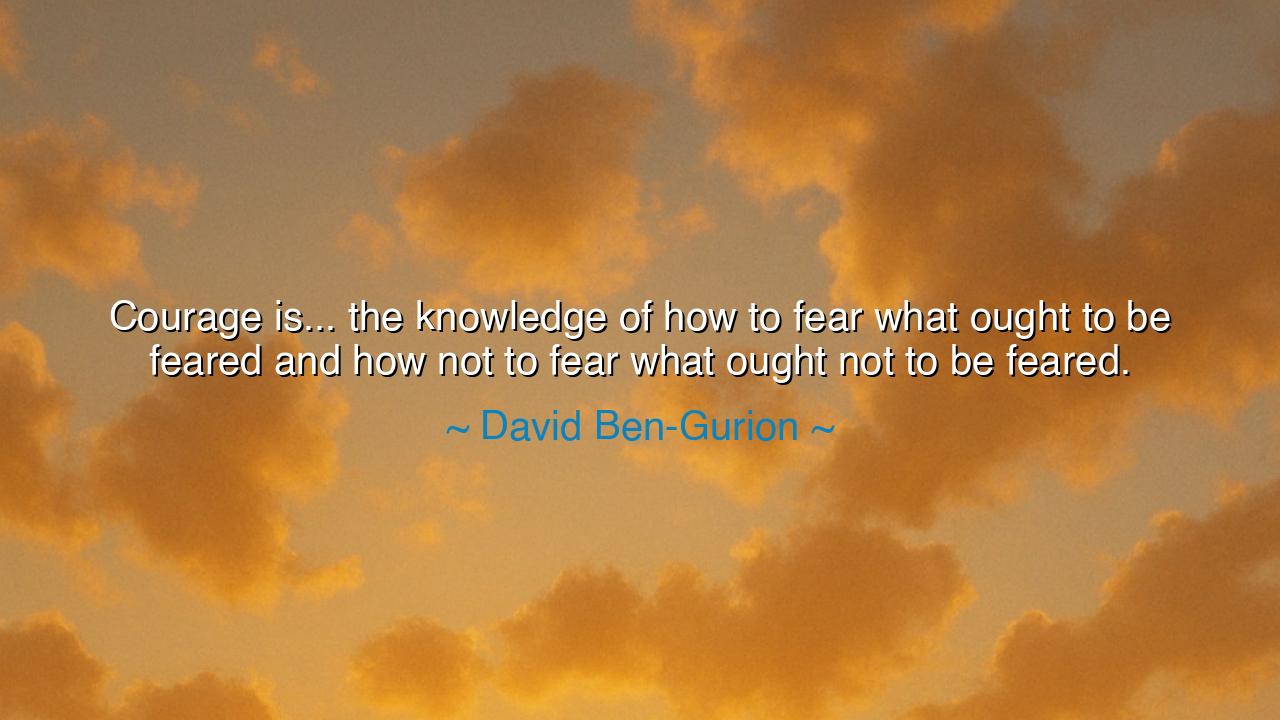
Courage is... the knowledge of how to fear what ought to be
Courage is... the knowledge of how to fear what ought to be feared and how not to fear what ought not to be feared.






"Courage is... the knowledge of how to fear what ought to be feared and how not to fear what ought not to be feared." — David Ben-Gurion
Thus spoke David Ben-Gurion, the founding father of Israel, a man who had faced storms of history with a heart both fierce and wise. In his words lies a truth as old as the dawn of nations — that courage is not the absence of fear, but the mastery of it. He teaches that to be brave is not to cast away trembling, but to understand it, to know which fears are worthy and which are worthless. True courage, he reminds us, is wisdom in the face of terror, the ability to discern between the shadows that threaten the body and those that only haunt the mind.
For there are fears that save, and fears that enslave. To fear what ought to be feared — the corruption of one’s soul, the betrayal of conscience, the silence in the face of evil — this is the sacred fear that keeps a man righteous. But to tremble before hardship, before pain, before the uncertain path of duty — that is the fear which must be conquered. The coward flees from danger, but the wise man stands his ground because he knows that the loss of honor is a far greater peril than the loss of life. Thus, Ben-Gurion’s wisdom joins that of the ancients: that courage is not the death of fear, but the victory of reason over it.
Ben-Gurion himself lived this truth in the crucible of his people’s struggle. In 1948, when the young nation of Israel was surrounded by enemies and outnumbered in arms, many urged delay, counsel, or retreat. But Ben-Gurion, seeing what others feared, declared the birth of the state. He did not deny the danger; he feared not the armies of men, but the failure to act when history called. His courage was not recklessness — it was discernment. He knew that there are moments when fear of destruction must yield to the fear of dishonor, when hesitation becomes the greater risk. And so, through courage guided by wisdom, a nation was born.
The ancients too understood this harmony between fear and courage. Aristotle once wrote that courage is the mean between cowardice and rashness — between fearing too much and fearing too little. The rash man fears nothing and perishes; the coward fears everything and achieves nothing. Only the courageous man, who knows what deserves fear, walks the golden path of wisdom. In this, Ben-Gurion stands in their lineage, for his courage was tempered not by arrogance, but by clarity. The fearless man is blind; the courageous man sees clearly, yet moves forward still.
Look to the story of Socrates, standing before his judges in Athens, condemned for corrupting the youth and questioning the gods. He feared not death, for he believed that wrongdoing was the only true evil. “A good man,” he said, “cannot be harmed in life or death.” Here was a soul who feared only moral failure, not the loss of breath. This is the courage that Ben-Gurion speaks of — a courage that springs not from the heart alone, but from the union of heart and mind, of conscience and understanding.
Such courage, born of right fear, is what the world needs most. Too often, men fear ridicule more than wrongdoing, rejection more than injustice, the loss of comfort more than the loss of truth. They cower before the opinions of others while neglecting the quiet voice within. But to be truly courageous is to fear dishonor more than danger, to value integrity above safety, and to serve truth above approval. This is the courage of heroes, the courage that builds nations, saves souls, and redeems the world.
So, my child of light and struggle, take this wisdom into your heart: learn to fear wisely. When fear comes, do not banish it, but question it. Ask, “Is this fear born of love or of weakness? Does it guard my virtue or hinder my purpose?” If it serves your soul, respect it; if it binds you, cast it aside. Fear the loss of kindness, not the loss of comfort. Fear the decay of conscience, not the decline of fortune. Fear silence in the face of injustice, not the noise of those who oppose you.
For in mastering this art — in knowing what to fear and what to defy — you shall discover the highest form of courage. It is not the shout of the warrior nor the silence of the sage, but the calm, steady voice that says, “I will stand for what is right, even if I stand alone.” And in that moment, when your fear bows to wisdom, you will find not only courage, but peace — the peace of one who walks in truth, unshaken by the storms of the world.






AAdministratorAdministrator
Welcome, honored guests. Please leave a comment, we will respond soon